Subbuteo: Is table football enjoying a resurgence?
- Published
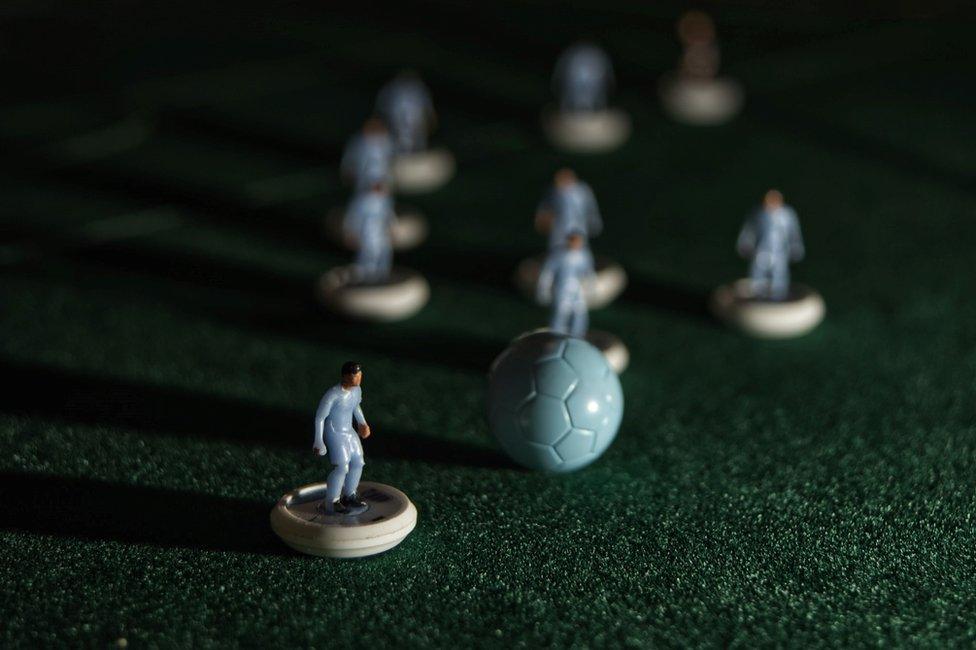
Haverhill Rovers Subbuteo and Table Football Club started with just Gerry Harrington and his son Joe
For years Joe Harrington played football games on his computer. Then his father, Gerry, introduced him to his own childhood game - Subbuteo. They are among a growing number of people who have fallen (or re-fallen) in love with Subbuteo. What's the appeal of the (miniature) beautiful game?
"Subbuteo is making a resurgence in the UK," says Gerry Harrington. "I think it coincided with lockdown, when people found themselves at home more and looked in their lofts for board games to play."
Mr Harrington senior runs the Haverhill Rovers Subbuteo and Table Football Club in Suffolk.
Two years ago, the club had just two members - Gerry and his son Joe.
The club's membership is now in double figures, with members coming in from miles around, including Cambridge and Ipswich.
In January, the club will host a Federation International Sports Table Football open international event.
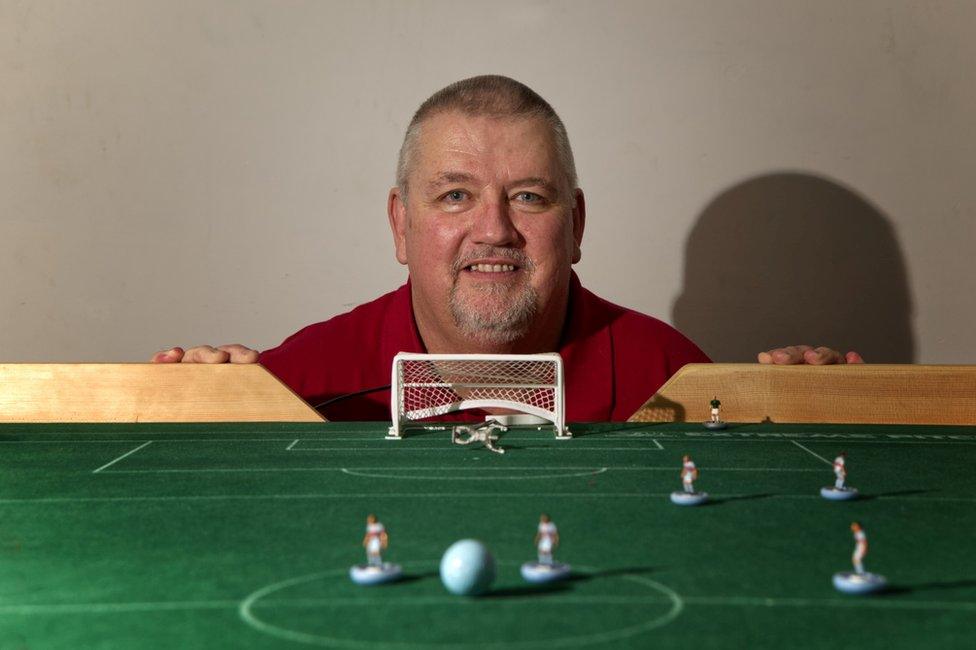
Gerry Harrington started the club after rekindling his passion for the game with his son
"We are kind of in a resurgence here.
"The hobby has diversified. It is not just about playing. I enjoy the playing but some people have got stadiums - there's a guy with a replica of Aston Villa's stadium and he is putting in the fans. A lot of people are recreating stadiums," says Mr Harrington, who played for West Ham's youth team and once for their reserves.
"The art work that is done on the players has to be seen to be believed - some of the players even get their own hair styles.
"When I first played in the 1970s the rules were printed on an A4 sheet of paper. There is now a 63-page booklet of the rules."
"I know of players at other clubs who have had mental health issues and it has really brought them out.
"Since lockdown it has been phenomenal. There are multiple clubs all over the country now.
"People who were not so great at football but who nevertheless really loved football can end up being great at Subbuteo, and end up playing at the national level."
The BBC has asked the current makers of Subbuteo, Longshore Limited, whether the resurgence claimed by people like Mr Harrington is being reflected in set sales.
The company is yet to respond.
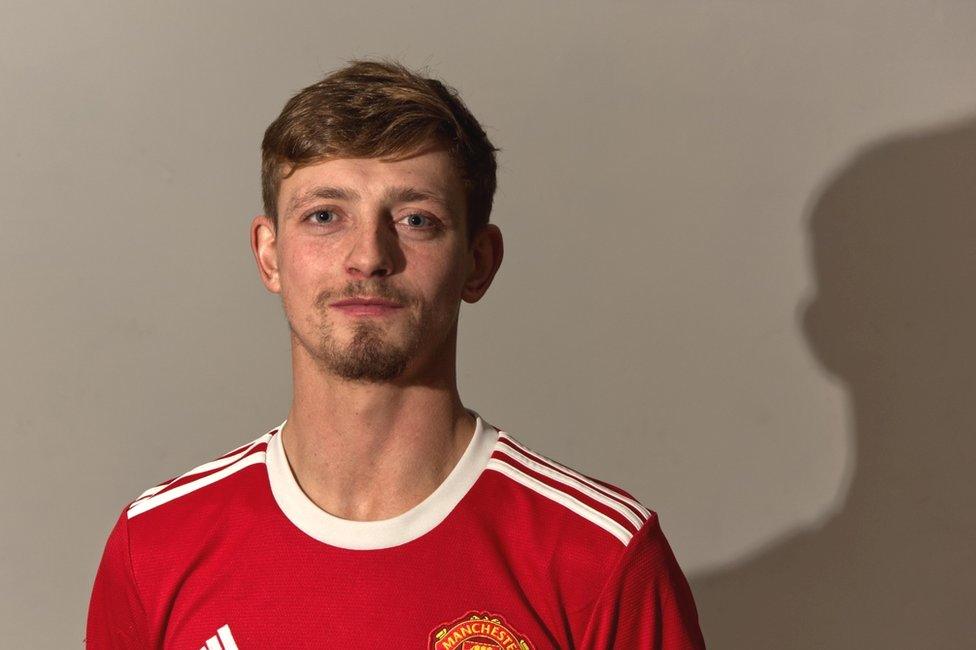
Joe Harrington says he can often beat his father at Subbuteo by speeding up his game play
Joe Harrington says he used to be an avid player of console-based football games.
That changed, he says, when he bought his father a Subbuteo set and the pair started playing together.
"I've not looked back," he says.
But while his father often wins matches at home, Joe often wins at club nights.
"I tend to be a quick player," he says. "And sometimes you can win by playing quickly as it gives the other player less time to think."
Before matches, Subbuteo enthusiasts give each of their players' bases a quick rub and polish to help them slide better across the pitch.
"Some people even grow their index fingernails to help with the flicks," says Joe.
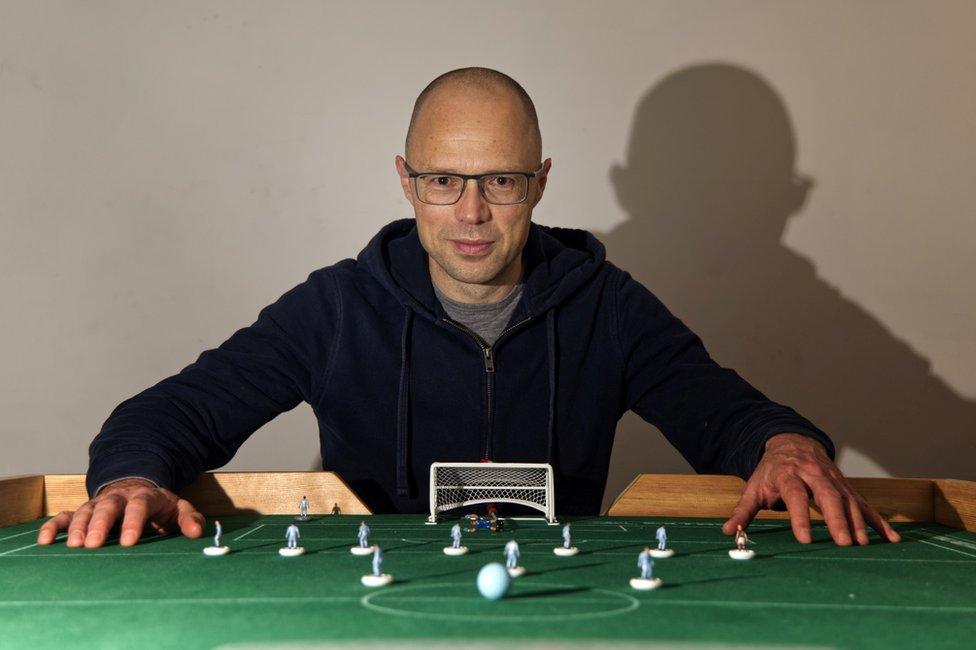
Spurred on by a sense of nostalgia, Mike Williams joined the club after buying a Subbuteo set to replace the one he had as a child
Recent club joiner Mike Williams, who lives in Cambridge, has normal fingernails.
His route to becoming a Subbuteo fan began with a sense of nostalgia about football sticker albums from the 1980s.
"I started buying up sticker albums and then stumbled across Subbuteo and then I realised there was this Subbuteo set that I had, it was a World Cup set from 1986.
"I must have lost it along the way so I got a new one and then I started collecting the clubs from the first year I was into football, and then I felt I wanted to actually play the game.
"I started looking around for clubs but there was nothing in Cambridge and then I realised there was a club here so I got in touch.
"It is really friendly and good fun."

Subbuteo, a short history
Subbuteo was created by Peter Adolph in 1946 and the first set contained goals made of wire with paper nets, a ball and cardboard playing figures on bases made from buttons weighed down with lead washers.
These first figures were made from flat cardboard, known later to collectors as "flats". Both chalk and instructions were included in the set to mark out the pitch.
In 1961 Peter Adolph introduced a three-dimensional hand painted plastic figure and after several design modifications, this figure evolved into the classic "heavyweight" player.
In 1980 the new lightweight figure was introduced.
Hasbro bought the rights to Subbuteo in 1994. In 2020 Longshore Ltd was awarded the license to produce sets by Hasbro.
Source: Subbuteo, external

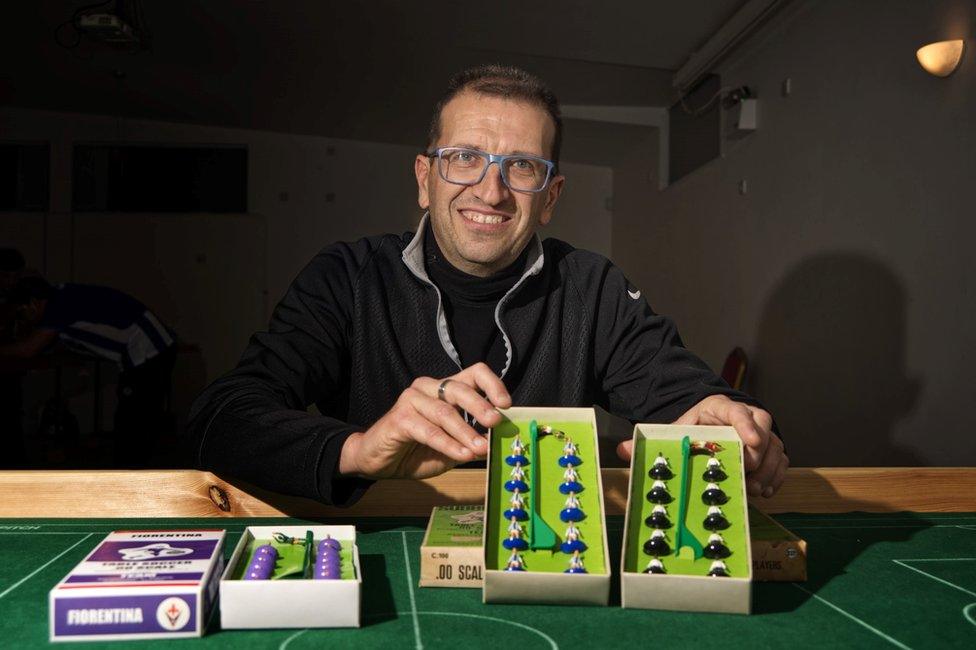
Walter Baroncini compares playing the game with a form of time travelling back to his childhood
Friendly and fun, perhaps, but serious too. This is especially the case when it comes to collector-players.
Originally from Pisa, Italy, Walter Baroncini has more than 200 team sets in his collection.
But while his fellow club members tend to play with the more modern flat-base players, Mr Baroncini's passion is for the original, semi-circular based, Subbuteo models.
In his spare time, he will sometimes play alone, using two teams.
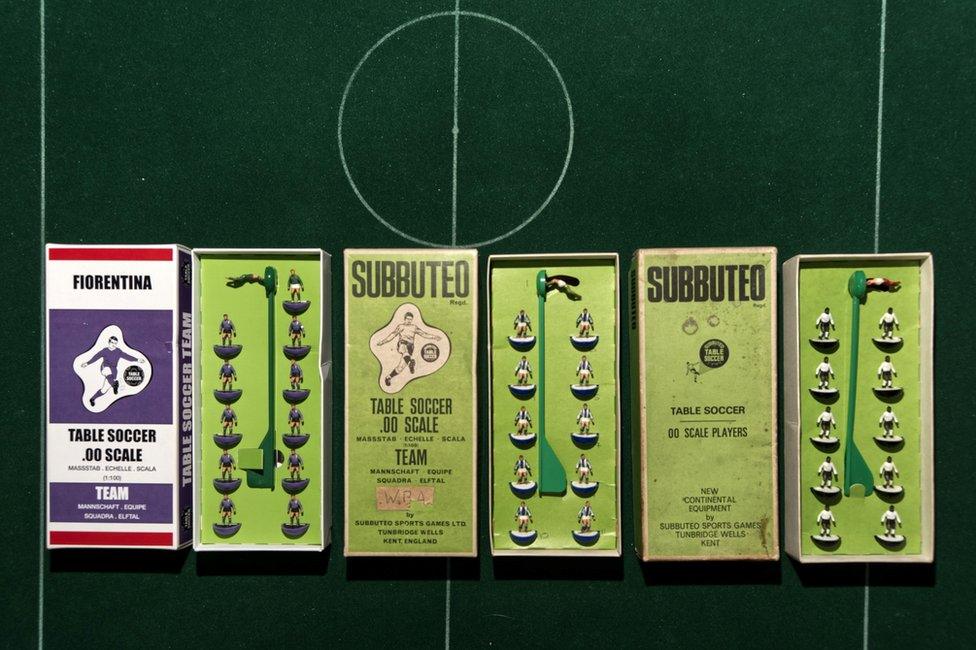
A fraction of Mr Baroncini's full collection
"I love it," he says. "This is how I played 40 years ago when I started."
Like many of the club's members, Mr Baroncini played the game as a child but has only resumed playing a couple of years ago.
"When I found in the loft an old box with the Subbuteo sets that I collected as a child I said, 'Oh dear, I want to go back and play,' and I found there was a great community in Italy and in the UK."
He compares playing the game with a form of time travelling back to his childhood.
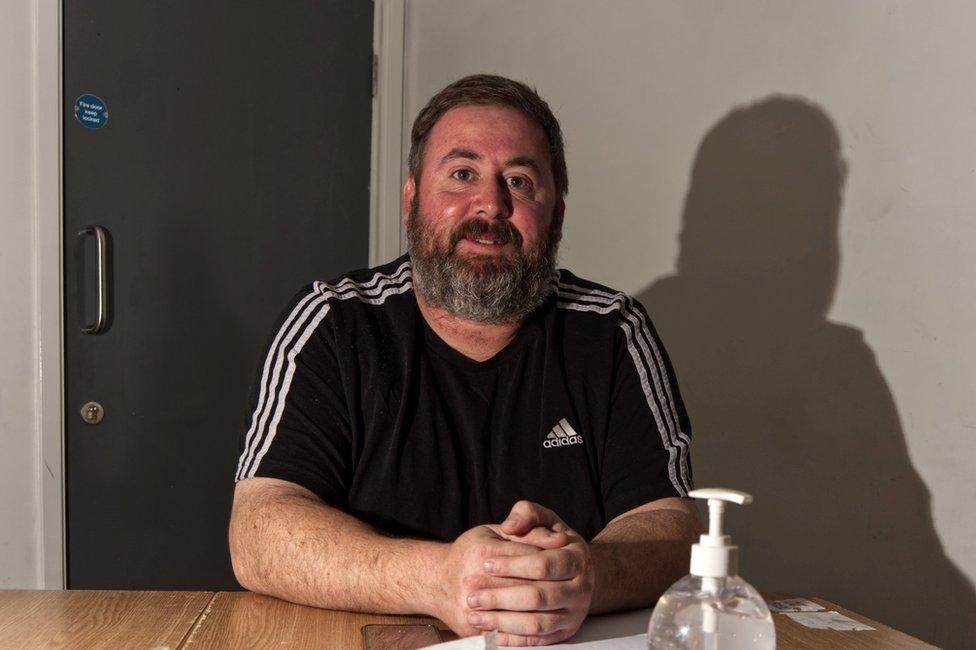
Adam Moss is currently injured with a bad back but comes along anyway, he says, for the company and to have a laugh with friends
While a damaged metatarsal, groin strain or pulled hamstring will put a professional footballer out of action, the Achilles heel for Subbuteo players is a sore back or an injured finger.
One such casualty is Adam Moss.
"I'm doing the admin tonight," he says.
"I normally play but I've pulled a muscle in the bottom of my back. Unfortunately, in this game, the position you play in doesn't lend itself to having a sore back.
"It is a great craic here," he says. "We have banter between all the lads who play, it is great together and we have a laugh."
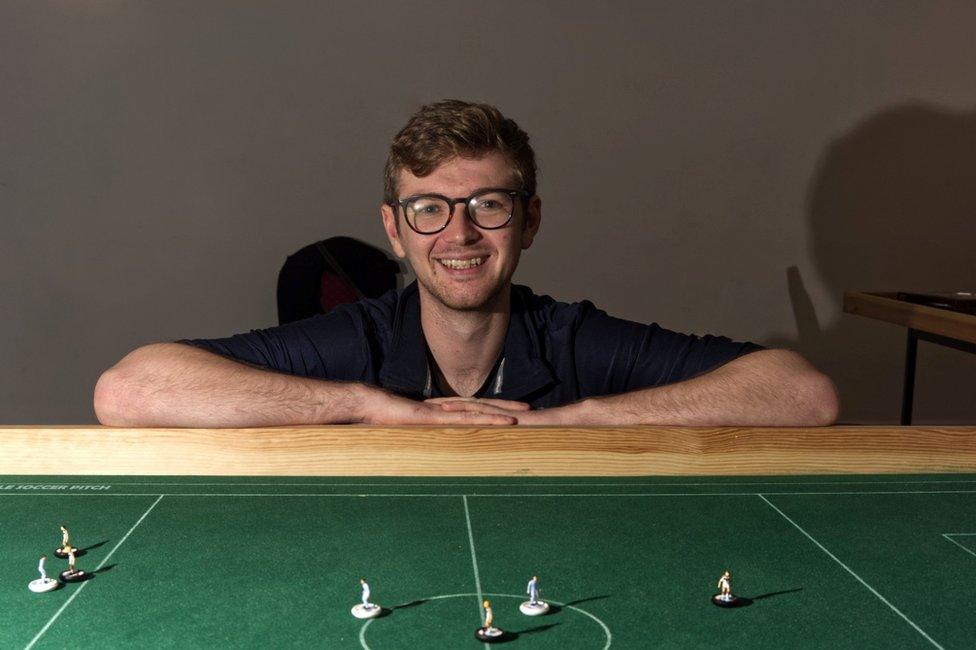
New member Sam Curtis says Subbuteo is like chess but "better" because of the football element
Sam Curtis was taking part in his first night with the Haverhill club.
"It has gone really well, everybody is really nice and welcoming.
"There's a good mix of abilities and a nice competitive atmosphere here.
"It is something to test your mind a bit," he says.
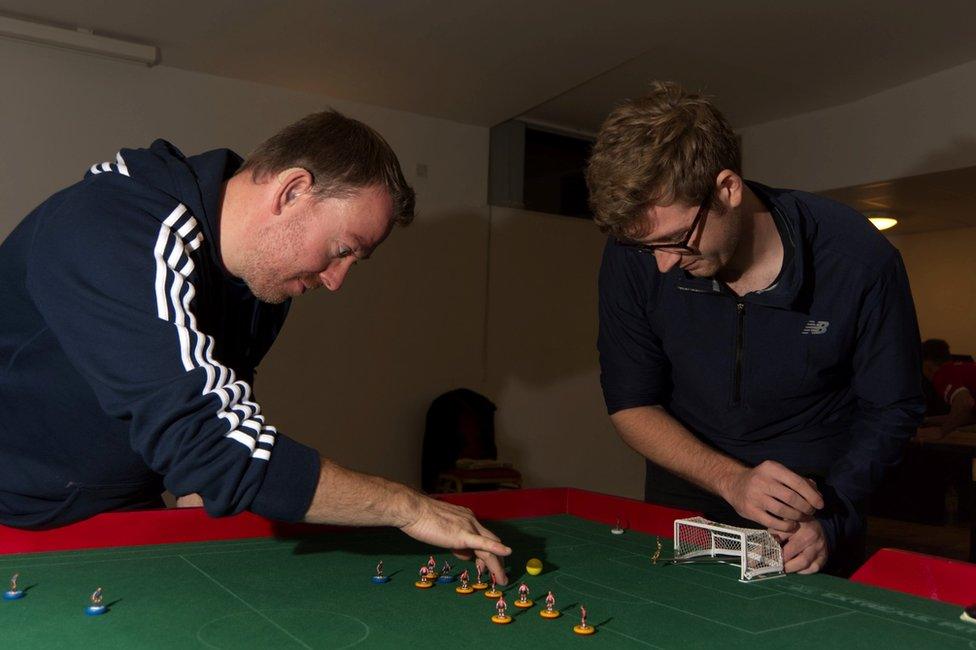
Kevin Cordell (left) plays with both the Haverhill club and one in Stanway, near Colchester in Essex
"I don't want to play chess, I don't want to play draughts so I get to have a go at something that is a bit like chess but better, and more akin to my interests in football. And it is something you can visibly get better at as well."
Having played at a high level as a child, Mr Curtis described how he was keen to return to playing after lockdown.
"It is the social aspect of it," he says, "as well as the competitiveness and just trying to aim towards something and be good at something and to craft your ability".
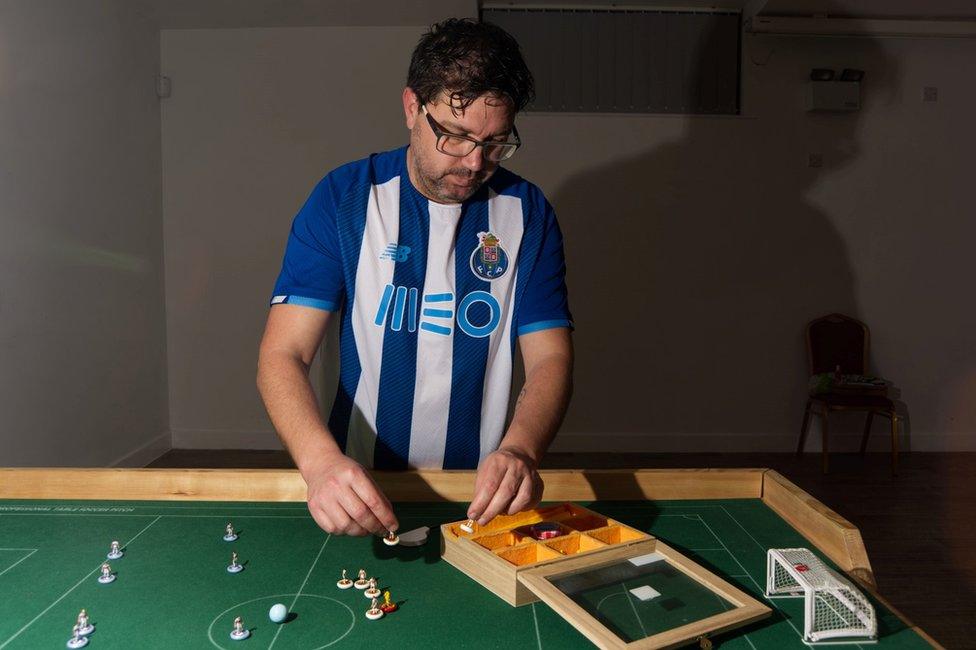
At the end of the night, Marco Barqueiro returns his team to a lined wooden box he made by hand
While all of the Haverhill members are currently men, Gerry Harrington says he really wants that to change.
"One of the best players and a future world champion is a girl aged 12. She is beating grown men and she is fantastic.
"We're hoping we can take it to the younger generation and get them involved."

Find BBC News: East of England on Facebook, external, Instagram, external and Twitter, external. If you have a story suggestion email eastofenglandnews@bbc.co.uk, external